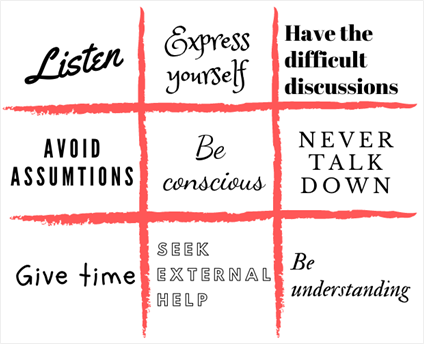
9 Pointers for Interpersonal Communication
Description
Each one of us has a unique and distinct way of expressing ourselves by the way we communicate with people, be it in a personal or a professional capacity. Our communication style changes depending on how we are raised, the circumstances we face or even when we follow the patterns of the people around us.
Communication might be the only solution for any relationship to sustain itself, and this includes a marriage, relationships between siblings, family, friends and even colleagues. We can’t deny that it is key to not only success, but also to maintain good mental health. These are 9 pointers that can help improve communication:
- 1. Listen - When it comes to a fruitful communication, listening could be more important than actually talking. We need to take time to listen to what the other person is saying instead of monopolising or maybe even dominating the conversation or discussion. When we pause, listen and give the other person the chance to talk, we realise that the conversation becomes more engaging and meaningful.
- 2. Express yourself - It is equally important to make yourself heard. Let’s be courageous to voice our opinion when we have one, to let someone know they are doing something wrong when they are and to ask questions when we’re lost, unsure or doubtful. The results won’t always be the best, we might even be mocked or ridiculed, but only by expressing ourselves will we learn and grow.
- 3. Have the difficult discussions - These could be on issues that we tend to avoid talking about in our relationships because it makes us anxious or nervous. Some conversations are uncomfortable, but they are necessary. It is always best to discuss the issue instead of walking on eggshells around the other person. In the end we may even realise that talking about it brings us even closer to the person.
- 4. Avoid Assumptions - We should never assume the intentions or motives of another person. Assumptions only lead to misunderstandings, which further leads to disputes. If there is something on our mind, it is always better to talk about it rather than assuming the worst, overthink or obsess about the situation.
- 5. Be conscious - It’s important to be conscious of the words we speak, because what we say can make or break another person. This doesn't mean that we must be dishonest about how we feel, criticism is never wrong but it should be delivered in a proper manner. Even in anger it’s always important to have a control over our words, though sometimes this might be really difficult. Not only might we say things we will later regret, but we may also end up causing a lot of hurt.
- 6. Never talk down - When we interact with others we should treat them as our equals, especially when we might have an advantage over them. When we talk down to someone they end up losing respect for us and it makes us less approachable. We tend to talk down to people when we assume we know more than them or that they don’t understand certain things or even because we believe that we are better than them.
- 7. Give time - There are people who like to talk about what's on their mind when they are upset or disturbed, and then there are people who don’t. When dealing with the latter, it is always wise to give them time to sort out their mind. Don’t try to force people to talk when they clearly don’t want to. We might have the best intentions at heart, but until the other person is ready to open up and share, it’s better to provide support and comfort by just being there for them.
- 8. Seek external help - As humans we aren’t perfect, we can only try. Sometimes when we have tried our best but are still not able to achieve effective communication within relationships, we can try asking for help from trusted resources. This could be through the intervention of a therapist or even a good friend or family member. Outside help can provide fresh perspective and help sustain relationships.
- 9. Be understanding - In the end it all comes down to this... to be understanding, willing to compromise and accept change. It’s not about winning or losing an argument, but understanding the other person’s point of view and where they are coming from. This is pertinent if what we are striving for is indeed growth in our relationships.

